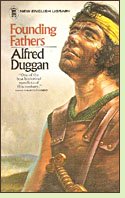Founding Fathers
(also titled Children of the Wolf)
by Alfred Duggan
Reviewed by David Maclaine

Alfred Duggan's charming Founding Fathers begins with the founding of Rome by Romulus and Remus, shows their fatal collision, and the decades that follow, when the surviving brother maintains precarious rule over the rough outpost on the Tiber. The acquisition of the Sabine women, several short wars, the ultimate fate of Romulus and the problem of finding a successor provide much of the drama, but the novel's real thrust is the story of how people of varied backgrounds came together to build a city like nothing that had been seen before.
Duggan tells the story through an assortment of characters, each of whom enters in succession as the city grows. First is a Latin follower of Remus who switches allegiance to the more ruthless brother and soon finds himself with a Sabine wife. Next is a Sabine immigrant, who accidentally stumbles into the upper tiers of the new society. After that comes an Etruscan refugee, trained in that nation's priestly rituals, and he too wins a place among the city's elite by a freakish stroke of luck. Last is a Greek from the south who, like the others, soon finds himself an unexpected place in this unexpected city.
As always, Duggan's great strength is his ability to create companionable characters, along with his distinctive narrative style with its mixture of good nature, directness, and sly humor. As Rome survives its divisions and Duggan's likeable characters keep finding more reasons to stay instead of seeking their fortunes elsewhere, we observe the infancy of various institutions that would endure for centuries, and the start of a clever policy toward neighbors that will eventually make this heterogeneous boom-town the dominant power in Italy. Founding Fathers is an entertaining way to get in on the ground level of Roman legend, geography, and civic institutions. (1959, 283 pages) More about Founding Fathers at Amazon.comFounding Fathers appears on the list of The 50 Best Historical Novels for a Survey of Ancient Roman History
Other novels about early Rome:
Roma by Steven Saylor (2007), a time-sweep novel about Rome from its founding to the time of Augustus. See review or more info at Powell's Books
Black Ships by Jo Graham (2008), historical fantasy about an oracle who, after the fall of Troy, guides Aeneas on his journey to Italy, where he will found Rome. More info
Lavinia by Ursula K. Le Guin (2008), about the Italian woman who, according to legend, married Aeneas after the Trojan War and helped him found the city of Rome. More info
Nonfiction about ancient Rome:
The Rise of Rome by Anthony Everitt (2012). More info
Ancient Rome: The Great Men, Army and Wars by Robert F. Pennell (2011). More info
Ancient Rome: The Rise and Fall of an Empire by Simon Baker (2006). More info
Online:
Ancient Rome History at Ancient-Rome.com
Back to Novels of Ancient History
Back to Directory of Book Reviews